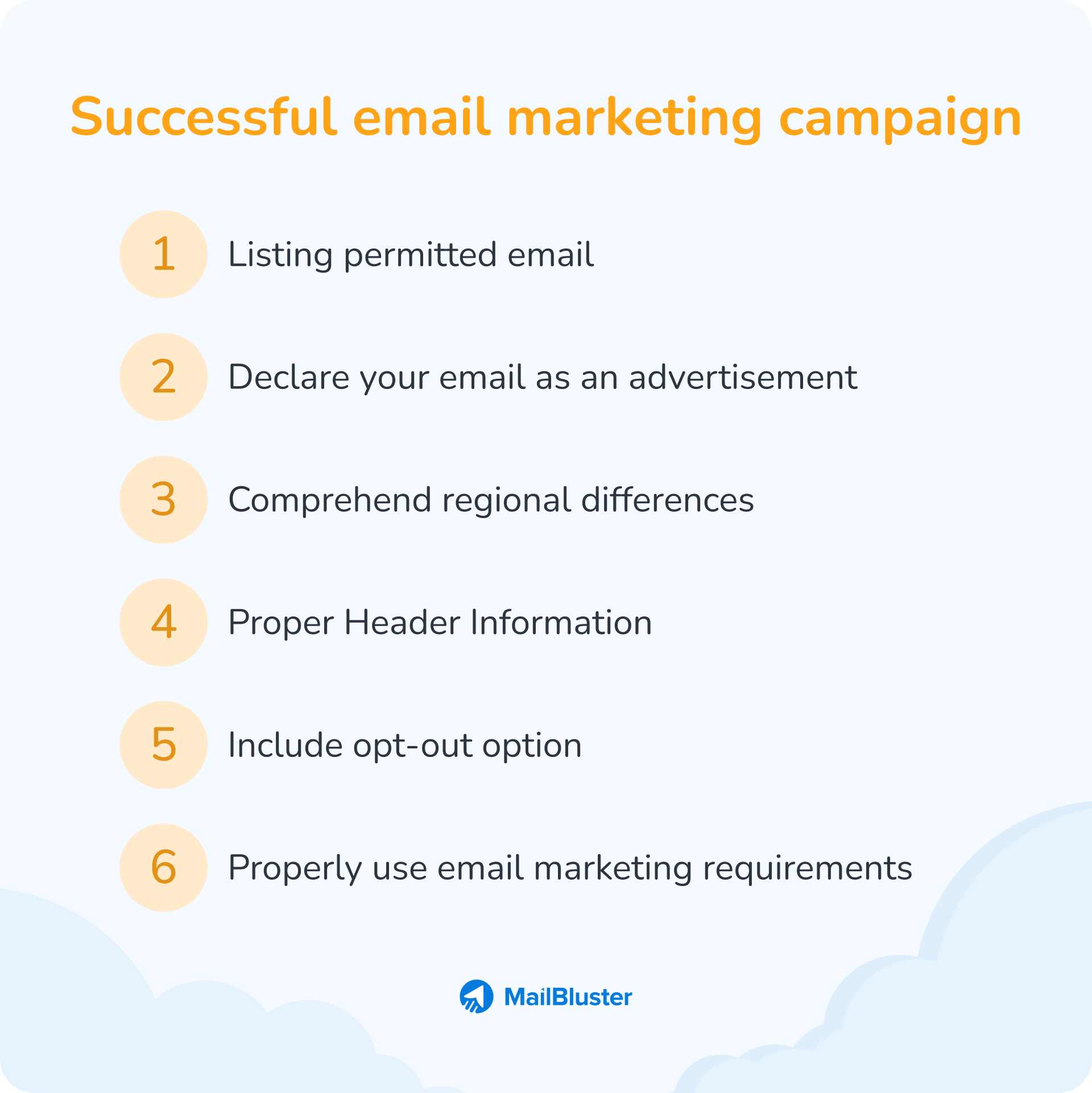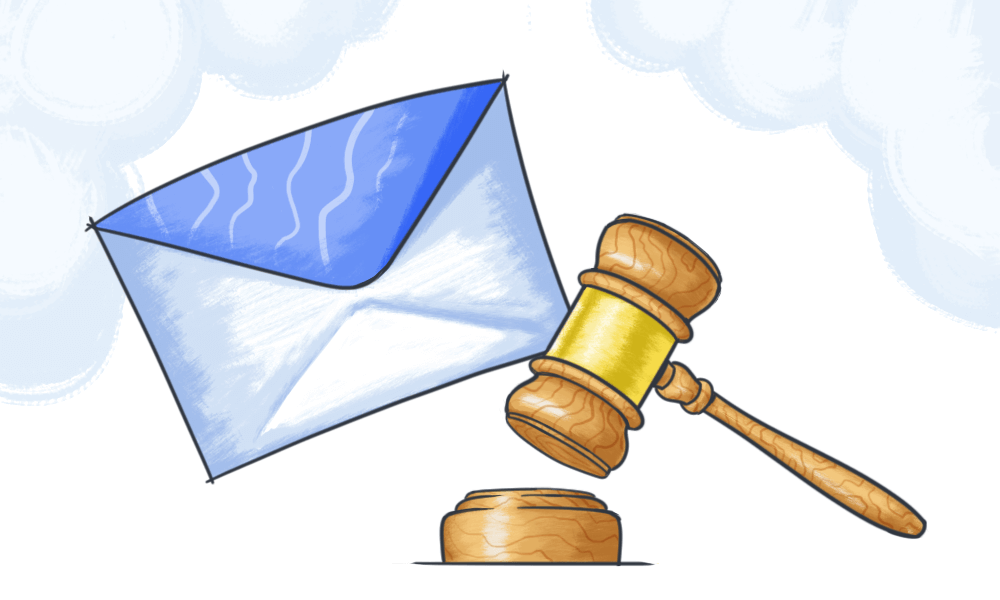Looking to maintain email compliance regulations?
Email is a direct source of communication between companies and organizations. This communication contains a handful of personal data and resources that require special rules.
So, conducting rules assists in avoiding any unauthorized actions when emailing.
But what does email compliance do?
Email compliance explains regulations and ensures safe communication between emails. In addition, they are upheld by several email compliance acts, such as the CAN-SPAM Act, HIPAA Act, and more.
Let’s dive deep into the different email marketing acts or rules for email marketing in the following.
What is an email compliance regulation?
Email compliance regulation is the set of legal requirements for email marketing. It contains laws and regulations to safeguard and protect email privacy and data. It follows data protection and anti-spam standards that ensure data privacy and security.
Email compliance broadly impacts the following matters
- Information you need to attach
- Who you can send an email
- Subscribers can opt-out easily
Every small and large business should stick to these email marketing rules. It ensures data privacy and security to avoid any kind of illegal emailing act.
Importance of email compliance regulations
Nowadays, email is a source of messaging, sending, and receiving private information for businesses and organizations.
But how do you protect this information while sending emails? Here, email compliance plays a crucial role.
Email compliance ensures the protection of the private information of users as well as from hacking or scamming your personal data. Not complying or following leads to the downfall of your business’s reputation and even getting hefty fines over lawsuits.
Let’s find out more significance in the following-
- Email compliance regulations help to protect users from unwanted emails
- This compliance shows users how to send ethical emails for marketing
- These laws prevent scams, spam, and hacking of your data
- Email compliance preserves users’ privacy and ensures data usage with consent
- These rules are also defined to prevent misleading information in email
- Email compliance regulations increase the chances of user engagement and subscribers.
- Email rules set the positive vibe from users and ensure getting higher engagement rates.
- Also, it helps gaining users’ trust, increase engagement in email, and get higher purchases
- It assists in maintaining best email practices by industry standards
- Knowing email compliance, at least 45 percent of people ignored opening unknown email addresses in 2019 as it may hamper their privacy
Primary email compliance regulations
Rules for email marketing escalate brand or company’s reputation. Here, users’ personal information and data play a crucial role that requires email supervision with regulations. Email compliance includes these regulation acts that every email holder needs to remember.
CAN-SPAM Act
Established in 2003, this regulation primarily expressed concern for promotional or business email. In addition, it’s not only for bulk email sending, but it also covers all the commercial messages that promote their product on email.
Take a look at the CAN-SPAM Act email marketing rules-
- Avoid misleading information. Users must adhere to the proper submission using the correct email addresses. Moreover, this also includes the domain name for email.
- Add an accurate subject line. Add a subject line that reflects the content of the email. Don’t deceive the recipient with deceptive practice.
- Send email as a promotion. State clearly that your message is promotional material or advertisement.
- Provide a valid physical address. Include your street address, mailbox, or post office box that you register with.
- Provide opt-out option for users. Users must include an opt-out option for recipients to stop receiving future emails. Pay attention to your spam filter that shouldn’t block the opt-out request.
- Honor opt-out request. Users must honor the opt-out request within ten business days. You can’t charge anything in return for an opt-out request.
- Supervise third-party email marketing if you hire one. You must comply with the email marketing requirements law even if you hire a third-party email marketing company.
Penalties
Each email that violates the law may face a penalty of at least $50,120 as a result of non-compliance.
GDPR Act
This act of compliance regulation applies to members of the European Union. This act was first established in 2018. GDPR regulates and manages all the businesses that hold users’ personal data. Let’s find out what they say about email marketing rules.
- Keep opt-in requests. Companies must have consent for opt-in requests and keep record of the request
- Grant data removing request. Accept the request for removing data from the company’s records, if the user requests
- Maintain a high level of IT security. Companies must maintain a high degree of security in all of their communication
Penalties
- Failing to comply with GDPR laws fine you at least 20 million euros or 4 percent of the company’s global turnover.
HIPAA Act
The HIPAA Act covers the health information shared by users in the health industry. Regarded as health information portability and accountability, it came into public in 1996. The data of users is called PHI or protected health information.
Find out what the act says-
- Storing user information. Ensure the user’s information is safe and available when needed.
- Secure information. Monitor and safeguard information from any security threats.
- Detect Improper usage of information. Always prevent improper usage of user’s information or disclosing it.
CASL Act
CASL, or Canada’s Anti-spam Legislation, is the act for fighting against cyber threats and spam. It was established in 2014. Furthermore, this act applies to any kind of electronic message such as text messages, email, or social media messages.
Let’s find out what the act says-
- Gain consent from the recipient. You must take consent from the recipient before sending any promotional email.
- Get opt-in from the recipient. Take opt-in consent from the recipient while sending the email and mention the opt-in request in the email.
- Include contact and opt-out. Include contact information and the opt-out option to let your recipient successfully unsubscribe.
Penalties
- Failing to comply with the regulations may fine you $1 million or, for businesses, $10 million. Individuals may face two years of imprisonment or businesses may face criminal prosecution.
PECR Act
PECR, or Privacy and Electronic Communication Regulation Act is the same act as the data protection and UK GDPR Act. This act provides specific rights related to electronic communication.
Let’s find out what this act says-
- Get customer consent. Send emails to your customer in some conditions but you need user consent for the first time sending.
- Email address Hiding. While promotional work and sending emails, you can’t hide your email address.
- Opt-out option. Customers must have an opt-out option to unsubscribe at any time.
Penalties
- Any organization or director who breaches the law may get fined up to 500,000 pounds.
ADA Act
ADA refers to the Americans with Disabilities Act, which mentions email marketing laws for disabled people. At least 15 percent of the world’s population lives with a disability. The purpose of this act is to make email marketing laws accessible to everyone.
See what this act mandates-
- Precise subject line. Make your subject line more descriptive to introduce your service or product.
- Background and text color. Emails should contain sufficient color and contrast between text and background colors.
- Accurate link text. Email text must contain accurate and meaningful link text to ensure it’s understandable.
- Readability. Logical reading order, heading elements, and coding must have a clear and accurate way to show the text.
Penalties
- A company or individual who breaches the law a single time will get fined up to $75000.
Australian Spam Act
This spam act derives from Australia and it was established in 2003. In addition, this law regulates all kinds of messaging, such as electronic messages, SMS messages, and instant messages used for business purposes.
Let’s find out what this act says-
- Getting consent. Getting user consent is the primary act of this law. It says users need to obtain user consent prior to sending promotional emails.
- Unsubscribe option. Provide an unsubscribe option to help users successfully opt out of the email notifications and receive future emails.
- Sender Identification. Sender must include the accurate address of their business email. This ensures transparent and constant communication between sender and recipient.
Penalties
- While sending unsolicited messages, the sender gets fined up to $1.1 million, or for corporations, $5.5 million.
- Breaching this law gets you imprisoned for 5 years if the charge against the sender is more serious.
Consequences of not following email marketing rules
We have already discussed the consequences or penalties you may face if you don’t comply with the email compliance regulations. Typically, you will get fined for breaching the law, and your brand or company reputation hampers at the same time.
- Penalties. You get penalties for violating rules for email marketing. Penalties range from $50000 to $21 million, which also depends on the severity and the type of email violation.
- Downfall of reputation. A company or organization that breaches email marketing laws gets reputational damage, and their relationship and brand loyalty with customers are also damaged.
- Downfall of Business. If the above penalties and reputational damage occur at the same time, the business may face severe losses and get closed for good.
Create Successful email marketing Campaigns
Email marketing is undoubtedly a traditional and widely-used marketing form in the industry. Also, email marketing requires certain laws to follow if you want to create a successful email marketing campaign.

Successful email marketing requires time, planning, making the right decisions, and targeting customers. Let’s find out how you can create a successful email marketing campaign by following the laws.
Listing permitted email
Email listing is one of the essential things to do. If you want to compile your email listing according to permitted, valid, and no duplicate listing, this will ease your workload. But listing your permitted list requires user consent at first. So, make sure you get the user’s consent.
Pro-tip
- Consent or permission varies in different countries as set by email marketing law. So, make sure you revise the email regulations set for different countries.
Declare your email as an advertisement
When you promote your service or product through email marketing, make sure you declare this as an advertisement. CAN-SPAM Act demands that you mention the product or promotion through an email campaign.
Pro-tip
- You don’t need to directly mention your email ‘’as an advertisement’’. Express your promotion in a way that the recipient doesn’t think it is a personal email.
Comprehend regional differences
Legal requirements for email marketing include different sets of laws for different regions. Different regions have identified the threats of email marketing and applied email laws and regulations. Authorities censor email communication or supervise email to protect it and provide direction on how they can use it.
Pro-tip
- Have a keen eye on providing personal data to other states or countries. If you provide personal data, ask them how they would store it.
Proper Header Information
Header information contains extra information that comes along with the email campaign. It comes with a subject line from the field or ‘reply to’ options. Email laws clearly state that these fields shouldn’t come up with extra information to lure users into opening emails.
Include opt-out option
Including an opt-out option is one of the necessary steps in email marketing. Email marketing laws clearly state that every marketer should include an opt-out option to let the subscribers unsubscribe easily.
Pro-tip
- Include an interactive CTA button for the users to unsubscribe easily
Properly use email marketing requirements
Sending emails requires you to use all the email marketing regulations properly. Take the user’s consent before sending the email, write with an accurate email subject, provide an opt-out option for the recipient, and ensure all-around accuracy in the email body.
Step-by-step guide on using legal requirements for business
Anyone can send an email with a tip of the hand. On the other hand, it includes legal requirements for email marketing that maintain what to do or what not to do when sending an email. This practice enables us to get a transparent email experience.
Let’s follow the step-by-step guide on how to send emails by following the law-
Comprehend the requirements
While sending emails for product or service promotion, comprehend the email marketing rules at first. Consult with the lawyer to familiarize yourself with the email compliance regulations. Email compliance is not only for emailing, but also it contributes to the brand reputation.
Get email archiving solution
Email archiving solution provides an easy solution for finding the information you need. Archiving solutions make it easy for you to find and store your information. So, consider getting an email archiving solution for future work.
Ensure proper implementation
Proper implementation of the email regulations is the requirement for setting up your business in email communication. Email communication is one of the vital factors for businesses to promote their products or services. First of all, ensure you get user consent before promoting your service.
Stay Updated with email compliance trends
Email compliance regulations change when they need to. So, you should track and have a sufficient understanding of the latest email marketing rules to ease your business promotion. Make sure you comply with the latest email marketing trends as well.
Reasons for email compliance regulations change
Email compliance changes as it requires. Businesses and organizations should regularly check for email regulation changes. Afterwards, ensure they are properly following the email marketing requirements.
Take a quick look at the reasons why email compliance changes-
- Emerging new technology. As the new technology emerges, data collection, communication, and tracking alter as well. So, the Compliance authority regularly keeps track of the latest tech and changes the regulations accordingly.
- Privacy concern. In this era, privacy is a major issue, and violators take control of the company or business’s accounts. So, regulators take the initiative to update email compliance to address these issues.
- Users demand. As privacy is a major concern, people are aware of their rights. So, compliance authority changes laws to make businesses more transparent. It assists users in obtaining the highest outcome for the promotion.
FAQ
- What are the email compliance laws?
Email compliance laws are the set of rules regulated by the government, industry, or state to ensure recipients are getting transparent email promotions with their consent.
- What does compliance email mean?
It refers to the adherence of a business or corporation to the email marketing laws and guidelines set by the authority or state.
- What is the corporate compliance email?
Corporate compliance email is the email that complies with the email compliance regulations and follows users’ consent, proper address inclusion, and subject lines.
- Is it illegal to send emails without permission?
Simply yes, sending unsolicited emails is illegal, and doing so may prosecute you by the government or state under email regulations.
Wrap UP
Operating a company or business is hard, but operating through regulations is even harder. Businesses must promote their products or services through email compliance regulations to avoid any kind of business losses.
By introducing these different legal requirements for email marketing, MailBluster hopes to provide transparent solutions for email marketers who are fond of extending their business to mass markets.
More email security-related blogs –
GDPR Double opt-in
Single opt-in vs. Double opt-in
Opt-in email list building strategies












 Contents
Contents
